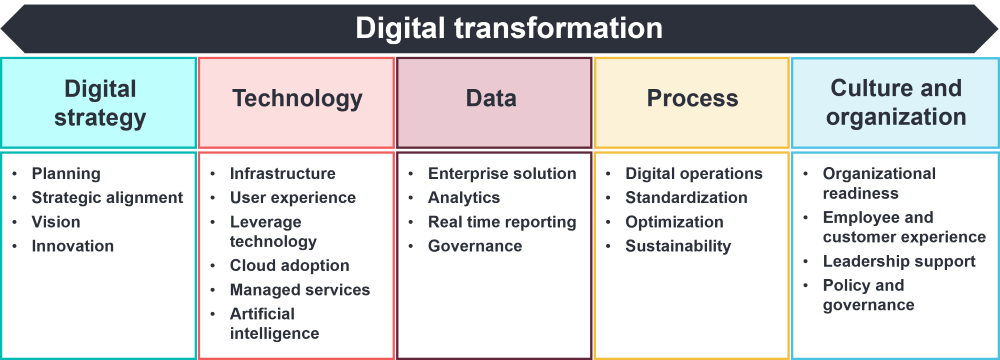Digital transformation is an on-going way to approach and determine an organization’s ability to stay relevant in our digital world. Your organization’s level of digital maturity will play a critical role in your ability to successfully undertake and sustain digital transformation initiatives. Digital maturity encompasses five components that help organizations determine their ability to grow, change, compete and enable their employees and customers in new ways: digital strategy, technology, data, process and culture/organization.
Digital maturity components
Each of these five components consists of sub-categories that define the established capabilities necessary for your organization to achieve your digital transformation goals. The process of digital transformation is the journey of progressing these different dimensions along a maturity scale so that your organization can gauge its level of digital competency and determine where value opportunities exist. The higher an organization can increase its digital maturity, the stronger the capacity will be to self-sustain further digital transformation and innovation.

Digital maturity is not just about technology, your organization needs to be assessing its capabilities across all five components as each one will play an important role in your success. For example, if your organization isn’t fully aligned with the change, lacks a strong culture or doesn't have people in the right roles, resistance will arise, and progress will be blocked – even if you have standardized processes or a strong strategic vision.
All these components work together:
- Digital strategy ensures you’ve got alignment across the organization, so that your digital transformation initiative aligns with your company’s focus, whether it's on growth, expense reduction, etc.
- Technology is part of staying relevant, whether it's moving to the cloud, using AI or implementing new systems that support your business better
- Data is necessary for real-time analysis of your business, allowing you to make data-driven decisions as you progress through your digital transformation goals

